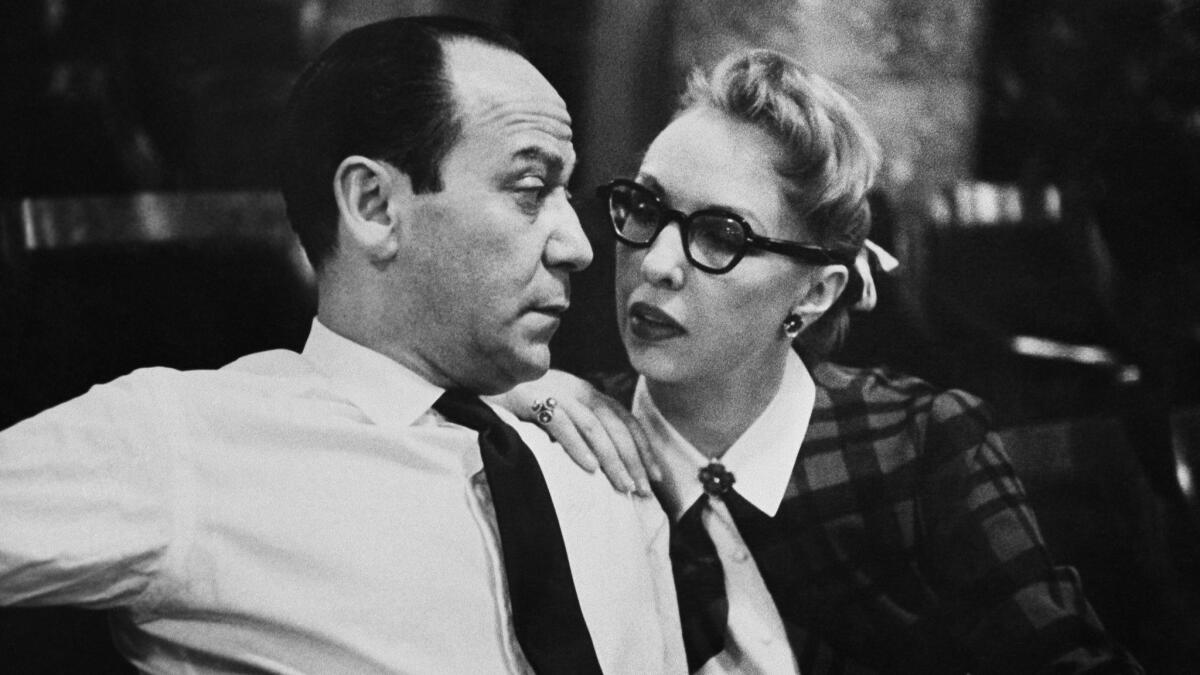Column: Baby, there’s nothing wrong with a little sexy banter at Christmastime

Reporting from San Francisco — Here is a Christmas gift to my critics, many of whom have accused me of being a humorless, feminist man-hater:
I love the song “Baby, It’s Cold Outside.”
I get a little thrill every time I hear the contrapuntal duet, a lovely back-and-forth between two smitten people who don’t really want their evening to end.
Of course, I can’t ever remember all the words. You probably can’t either. But I know enough of them to be able to state with certainty that the song is not “rapey” as some have claimed.
It’s not “inappropriate.” Nor “politically incorrect.”
It’s a catchy and sly attempt at seduction, a back-and-forth about the possibility of a cozy encounter. Between consenting adults.
What could be better?
And yet, every Christmas, our culture seems to require something pointless to fight over.
We don’t have the War on Christmas to kick around anymore. After Bill O’Reilly got the boot from Fox News, the imaginary cause he had championed melted away like Frosty the Snowman on a warm day.

Thus, the war on “Baby, It’s Cold Outside.”
Some radio stations actually yanked it from their Christmas music rotations this year.
“To some modern ears,” reported the New York Times, “the lyrics sound like a prelude to date rape.”
I must be getting old.
They sound like romance to me.
::
The other night in San Francisco, where throngs of holiday shoppers crowded the sidewalks around Union Square, and one of my Lyft drivers was dressed up as Santa Claus, I saw a Christmas cabaret performed by the Gay and Lesbian Chorus of San Francisco.
The show, at a club in the Castro called Martuni’s, was a high-spirited antidote to some of the smarmier aspects of the season.
As you might imagine, it was full of tweaked, gay-themed Christmas songs and plenty of bawdy lyrics. (“Walking ’round in women’s underwear.” “What child is this? Don’t say it’s mine.”)
For me, of course, the high point was “Baby, It’s Cold Outside,” with lyrics that had been reworked by chorus member Krissa Lagos, a San Francisco writer and editor, who also happens to be my niece.
Over Thanksgiving, Krissa had been struggling with rhymes, and I was happy to hear that she managed to keep the playful, spirited tone of the song when she performed her version with duet partner Eliza Speece, a humane educator at the San Francisco SPCA:
“I really can’t stay.”
(“Baby, I’m fine with that.”)
“I’ve got an early day.”
(“No worries, you told me that.”)
“And the kitty will be pacing the floor.”
(“You’re a cat mom? So gay.”)
Reworking lyrics for live shows is a wonderful tradition. Giving a contemporary gloss to an old favorite is more of a compliment than an insult.
After all, if we really hated the tune, we wouldn’t keep singing it, would we?
I am a huge Christmas song nerd, and will be playing them for at least another week.
The jolly songs are fine, but I prefer the poignant songs, like “Have Yourself a Merry Little Christmas” and “Christmas Time Is Here” from “Peanuts,” which is sometimes called the saddest Christmas song of all.
Maybe that’s because Christmas can be such a bittersweet time of year. It’s a time when we count our blessings but also tote up our losses. We become acutely aware of how much we are given, and how others have so much less.
The lyrics I love most reflect our humanity — the grief we feel when we are apart from loved ones, the joy (and pain) we feel when we are together, the importance of passing cherished childhood beliefs to the next generation, the sheer joy so many feel at the retelling of Christ’s birth.
The world is a mess, but we will muddle through somehow.
::
Many people before me have noted a stunning irony about America’s most beloved Christmas songs: Most were written by secular Jews. Many were written for movies.
Jay Livingston and Ray Evans wrote “Silver Bells” in 1950 for the Bob Hope movie “The Lemon Drop Kid.” Irving Berlin wrote “White Christmas” in 1942. Ralph Blane and Hugh Martin wrote “Have Yourself a Merry Little Christmas” in 1944 for “Meet Me in St. Louis.”
Frank Loesser, the great Broadway composer and lyricist, wrote “Baby, It’s Cold Outside” in 1944 to sing at parties with his wife, Lynn Garland. It was, she said, their ticket to all the best bashes. Five years later, to Garland’s distress, Loesser sold the tune to MGM for the 1949 movie “Neptune’s Daughter,” starring Esther Williams and Ricardo Montalban. It won a best song Oscar.
“I felt as betrayed as if I’d caught him in bed with another woman,” Garland said, according to the 2006 book “America’s Songs: The Stories Behind the Songs of Broadway, Hollywood, and Tin Pan Alley.”
Some years ago, I wrote a story about the genesis of the great Christmas song “Silver Bells” by Jay Livingston and Ray Evans, who had churned out many hits in the ’40’s and ’50’s, including “Que Sera Sera,” “Mona Lisa” and — to my amusement — the theme for “Mr. Ed.” Together they won three best song Oscars.
When I reported the story, Ray was an 89-year-old widower and an absolutely shameless flirt.
At his home in Beverly Hills, he offered to show me his royalty books. He wanted to prove that “Silver Bells” generated about $800,000 a year. The books were in his bedroom downstairs.
“You’re sure your husband won’t mind?” he asked mischievously as he settled onto an electric chairlift on the staircase.
That Christmas morning, I was home celebrating with my family.
Ray called.
“I could not have paid a publicist to get me such great coverage!” he gushed. “I want you to go to Tiffany’s and pick out anything you want. It’s my gift to you.”
I let him take me to lunch at the Polo Lounge instead.
Why? Because there is nothing wrong, and there never was, with a little bit of flirting.
Twitter: @AbcarianLAT
More to Read
The biggest entertainment stories
Get our big stories about Hollywood, film, television, music, arts, culture and more right in your inbox as soon as they publish.
You may occasionally receive promotional content from the Los Angeles Times.











